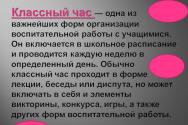Упражнения по английскому на простые времена. Базовые времена в английском языке
Упражнение 1Present Continuous или Present Simple.
His father (not to watch) TV at the moment. He (to sleep) because he (to be) tired. 2. Pat (not to cook) dinner at the moment. She (to talk) dinner every Monday. 3. I (not to drink) coffee now. I (to write) an English exercise. 4. I (not to drink) coffee in the evening. I (to drink) coffee in the morning. 5. Your friend (to do) his homework now? 6. Your friend (to go) to school in the morning? 7. Look! The baby (to sleep). 8. The baby always (to sleep) after dinner. 9. My grandmother (not to work). She is on pension. 10. My father (not to sleep) now. He (to work) in the garden. 11. I usually (to get) up at seven o’clock in the morning. 12. What your sister (to do) now? – She (to wash) her face and hands. 13. When you usually (to come) home from school? – I (to come) at three o’clock. 14. Where your cousin (to work)? – He (to work) at a hospital. 15. Your sister (to study) at college? – No, she (to go) to school. 16. My cousin (to go) to school every day. 17. My mother (not to play) the piano now. She (to play) the piano in the morning. 18.When you (to listen) to the news on the radio? 19. Who (to make) breakfast for you now? 20. You (to read) a magazine and (to think) about your holidays at the moment? 21. They (to be) good dancers but they (not to do) to discos very often. 22. What she (to talk) about right now?
Упражнение 2
Present Continuous или Present Simple.
1. I (not to know) what to give my brother for his birthday. 2. They (to want) publish this book in July? 3. She (to think) he (to drive) dangerously. 4. He (to understand) that he (to eat) noisily, but he always (to forget) about it. 5. Who that man (to be) who (to stand) in the doorway? 6. I (to have) no time now, I (to have) dinner. 7. Your family (to leave) St. Petersburg in summer? – Yes, we always (to go) to the seaside. We all (to like) the sea. Mother (to stay) with us to the end of August, but father (to return) much earlier. 8. Where Tom and Nick (to be) now? – They (to have) a smoke in the garden. 9. What you (to do) here now? – We (to listen) to tape recordings. 10. You (to want) to see my father? – Yes, I … . 11. Michael (to know) German rather well. He (to want) to know English, too, but he (to have) little time for it now. 12. What magazine you (to read)? – It (to be) a French magazine. There (to be) good articles on sports here. You (to be) interested in sports? – Yes, I … . but I (not to know) French. 13. We (to have) an English lesson now. 14. He (to feel) in a position to lend her money. 15. I (to think) she (not to feel) safe there. 16. You (to see) what I (to mean)? 17. You (to hear) what she (to say)? 18. He (not to feel) at liberty to tell you the truth. 19. Ron has got a new job. He (to earn) a fortune as a managing director. They (to think) he (to be) a bag of money.
Упражнение 3
Раскройте скобки, употребляя глаголы в Present Continuous, Present Simple или Future Simple .
1. My sister (not to like) coffee. 2. When you (to go) to bed every day? 3. What he (to read) now? 4. What he (to read) every day? 5. What he (to read) tomorrow? 6. You (to give) me this book tomorrow? 7. Where she (to be) tomorrow? 8. Where she (to go) tomorrow? 9. She (to go) to the country with us tomorrow? 10. They (to stay) at home tomorrow. 11. What you (to do) now? I (to see) that you (not to read). 12. When you (to finish) your homework? It (to be) very late, it (to be) time to go to bed. 13. How you usually (to spend) evenings? 14. What you (to do) in the country next summer? 15. They (not to drink) tea now. I (to think) they (to watch) TV. 16. What your father (to drink) in the evening? 17. When you (to get) up every day? - I (to get) up at seven o"clock. 18. My brother usually (not to get) up at seven o"clock. As a rule, he (to get) up at six o"clock, but tomorrow he (to get) up at seven o"clock. 19. Why she (to come) home so late tomorrow? 20. We (to go) to the country the day after tomorrow. 21. Our friends always (to go) to the country for the weekend. 22. Look! The kitten (to play) with its tail. 23. Your parents (to watch) TV now? 24. My sister (not to rest) now. She (to help) mother in the kitchen. She (to help) mother in the kitchen every day.
Не забывайте употреблять настоящее время вместо будущего в придаточных предложениях времени и условия после союзов if, when, as soon as, before, after, till (untill) .
Упражнение 4
Раскройте скобки, употребляя глаголы в Present Simple или Future Simple (Все предложения относятся к будущему времени).
1. If I (to stay) some more days in your town, I (to call) you and we (to have) a good talk. 2. He (to go) to the Public Library very often when he (to be) a student. 3. As soon as I (to return) from school, I (to ring) you up. 4. You (to pass) many towns and villages on your way before you (to arrive) in Moscow. 5. I (to stay) at home till she (to come). Then we (to go) to the theatre if she (to bring) tickets. 6. After I (to finish) school, I (to enter) the University. 7. When he (to return) to St. Petersburg, he (to call) on us. 8. If I (to see) him, I (to tell) him about their letter. 9. We (to gather) at our place when my brother (to come) back from Africa. 10. I (to sing) this song with you if you (to tell) me the words. 11. I hope you (to join) us when we (to gather) in our country house the next time. 12. What you (to do) when you (to come) home? 13. When they (to cross) the road, they (to see) the hotel. 14. Before she (to get) to the theatre, she (to go) past the shopping centre. 15. What we (to do) if it (to rain) tonight? 16. What she (to do) if she (to see) her best friend again? 17. If the bus (to be) very crowded, you (to be) exhausted by the time you (to get) to work. 18. If it (to be) very cold tonight, our car (not to start) in the morning.
Упражнение 5
Раскройте скобки, употребляя глаголы в Present Continuous, Present Simple или Future Simple .
1. It (to be) cold in autumn. It often (to rain). A cold wind often (to blow). 2. The weather (to be) fine today. It (to be) warm, the sun (to shine) brightly. A soft wind (to blow) Small white clouds (to sail) in the sky. 3. Don"t go out: it (to rain) heavily. 4. Take your raincoat with you. I am afraid it (to rain) in the evening and you (to get) wet through if you (not to put) on your raincoat. 5. Every spring birds (to come) to our garden and (to sing) in the trees. 6. Listen! Somebody (to sing) in the next room. 7. It usually (not to snow) at this time of the year. 8. What the weather (to be) like now? It (to snow)? - No, it ... . 9. We (to go) out of town to ski on Sunday? - Yes, we ... if it (to snow) this week and if there (to be) a lot of snow everywhere. 10. What you (to do) tomorrow? - We (to go) out of town if the weather (not to change) for the worse. You (to come) with us? - With pleasure, if only I (not to have) too much work to do at home. 11. If we (to have) televisions at our supermarket, they (to inform) customers about things in the store. 12. If we (to play) music, it (to produce) the right atmosphere. 13. If we (to put) in cameras, they (to stop) people stealing things. 14. If we (to employ) more assistants, they (to help) our customers.
Упражнение 6
Present Simple или Future Simple .
1. Он сделает упражнение по английскому языку, если у него не будет других дел. 2. Если я не помогу ему, он не напишет контрольную работу завтра. 3. Он не пойдет в библиотеку сегодня вечером. 4. Если он не пойдет в библиотеку, он будет дома. 5. Мы будем дома завтра. 6. Если мы будем дома завтра, мы посмотрим эту программу по телевизору. 7. Ее не будет завтра дома. 8. Если ее не будет завтра дома, оставьте ей записку. 9. Завтра погода будет хорошая. 10. Если завтра погода будет хорошая, мы поедем за город. 11. Когда она приходит в школу, она снимает пальто. 12. Когда она придет в школу, она снимет пальто. 13. Как только он вспоминает эту смешную сцену, он начинает смеяться. 14. Как только он вспомнит эту смешную сцену, он начнет смеяться. 15. Я приду домой в шесть часов. 16. Когда я приду домой, я позвоню вам. 17. Она позвонит нам вечером. 18. Если она позвонит вам, попросите ее принести мне книгу. 19. Я увижу Тома завтра. 20. Как только я увижу Тома, я расскажу ему об этом. 21. Я поеду в Париж на будущей неделе. 22. Перед тем, как я поеду в Париж, я позвоню вам.
Упражнение 7
Раскройте скобки, употребляя глаголы в Present или Past Simple.
1. His sister (to study) English every day. 2. She (to study) English two years ago. 3. You (to come) home at six o"clock yesterday? - No, I ... . Yesterday I (to come) home from school at half past eight. I (to be) very tired. I (to have) dinner with my family. After dinner I (to be) very thirsty. I (to drink) two cups of tea. Then I (to rest). 4. I (to go) to bed at ten o"clock every day. 5. I (to go) to bed at ten o"clock yesterday. 6. My brother (to wash) his face every morning. 7. Yesterday he (to wash) his face at a quarter past seven. 8. I (not to have) history lessons every day. 9. We (not to rest) yesterday. 10. My brother (not to drink) coffee yesterday.
Упражнение 8
Раскройте скобки, употребляя глаголы в Present Simple, Past Simple или Future Simple.
1. He (to turn) on the television to watch cartoons every morning. 2. He (to turn) on the television to watch cartoons yesterday morning. 3. He (to turn) on the television to watch cartoons tomorrow morning. 4. I always (to go) to the Altai Mountains to visit my relatives there. 5. I (to be) very busy last summer and I (not to go) there. 6. I (not to go) there next year because it (to cost) a lot of money and I can’t afford it. 7. They (to enjoy) themselves at the symphony yesterday evening? 8. Who (to take) care of the child in the future? 9. How often you (to go) to the dentist’s? 10. We (not to have) very good weather, but we still (to have) a good time during our short stay in London.
Упражнение 9
Раскройте скобк, употребляя глаголы в или Future Simple.
1. Kate (to cook) dinner every day. 2. Kate (to cook) dinner tomorrow. 3. Kate (to cook) dinner now. 4. Kate (to cook) dinner yesterday. 5. I (not to eat) ice cream every day. 6. I (not to eat) ice cream now. 7. I (not to eat) ice cream tomorrow. 8. I (not to eat) ice cream every day. 9. He (to spend) last summer in the country. 10. He (not to spend) last summer in the country.
Упражнение 10
Раскройте скобки, употребляя глаголы в Present Continuous, Present Simple, Past Simple или Future Simple.
1. Max (not to be) here. He (to wash) his car. He (to wash) it every weekend. 2. He (not to play) the piano tomorrow. 3. We (to see) a very good film last Sunday. 4. Your mother (to cook) every day? 5. We (to make) a fire last summer. 6. I (to spend) last summer at the seaside. 7. Where you (to spend) next summer? 8. Where he (to spend) next summer? 9. What mother (to do) now? – She (to cook) dinner. 10. I (not to play) computer games yesterday.
Упражнение 11
Present Continuous или Past Continuous.
1. I (to write) an English exercise now. 2. I (to write) an English exercise at this time yesterday. 3. My little sister (to sleep) now. 4. My little sister (to sleep) at this time yesterday. 5. My friends (not to do) their homework now. They (to play) volleyball. 6. My friends (not to do) their homework at seven o’clock yesterday. They (to play) volleyball. 7. She (to read) the whole evening yesterday. 8. She (not to read) now. 9. Now she (to go) to school. 10. What you (to do) now? – I (to drink) tea.
Упражнение 12
Раскройте скобки, употребляя в Past Simple или Past Continuous.
1. I (to go) to the cinema yesterday. 2. I (to go) to the cinema at four o’clock yesterday. 3. I (to go) to the cinema when you met me. 4. I (to do) my homework the whole evening yesterday. 5. I (to do) my homework when mother came home. 6. I (to do) my homework yesterday. 7. I (to do) my homework from five till eight yesterday. 8. I (to do) my homework at six o’clock yesterday. 9. I (not to play) the piano yesterday. 10. I (not to play) the piano at four o’clock yesterday. I (to read) a book.
Упражнение 13
Раскройте скобки, употребляя в Past Simple или Past Continuous.
1. When I (to come) home, my little sister (to sleep). 2. When Nick (to come) home, his brother (to play) with his toys. 3. When mother (to come) home, I (to do) my homework. 4. When father (to come) home, Pete (to sleep). 5. When mother (to come) home, the children (to play) on the carpet. 6. When I (to get up), my mother and father (to drink) tea. 7. When I (to come) to my friend’s place, he (to watch) TV. 8. When I (to see) my friends, they (to play) football. 9. When I (to open) the door, the cat (to sit) on the table. 10. When Kate (to open) the door, the children (to dance) round the firtree.
Упражнение 14
Раскройте скобки, употребляя глаголы в требующейся форме, так чтобы получить Present Continuous или Present Perfect.
1. What’s the matter? Why he (to stop)? 2. My cousin (to look) for a job, but he (not to find) a job yet. 3. It (to be) impossible for her to feel at home here. 4. What you (to study) now? 5. They just (to give) you a pay rise. 6. Sophie is busy. She (to knit) a sweater for her grandson. 7. You only (to have) a piece of cake? You not to eat much. 8. People (to plant) carrots and tomatoes now. 9. You (to go) to plant tomatoes this year? 10. Johnny, who finally (to find) a new job, (to give) a big party.
Упражнение 15
Переведите на английский язык, употребляя глаголы в Present Perfect или Present Continuous .
1. Она все еще печатает свою статью. 2. Мы ее давно не видели. 3. Бабушка с дедушкой уже навестили своих внуков. 4. Сейчас они сидят в гостиной и разговаривают о своей поездке. 5. Ты когда-нибудь был в Африке? 6. Он все сделал для нее. Теперь он еще собирается купить ей дом. 7. Концерт еще не начался, и мы сидим в зале и обсуждаем свои проблемы. 8. Подожди меня! Я не взяла деньги. 9. Я только что позавтракал. 10. Он уже позавтракал.
Упражнение 16
Раскройте скобки, употребляя глаголы в Present Perfect или Past Simple .
1. Helen speaks French so well because she (to live) in France. 2. She (to live) there last year. 3. The rain (to stop) and the sun is shining in the sky again. 4. The rain (to stop) half an hour ago. 5. Mary (to buy) a new hat. 6. I (to buy) a pair of gloves yesterday. 7. The wind (to blow) off the man"s hat, and he cannot catch it. 8. The weather (to change), and we can go for a walk. 9. The wind (to change) in the morning. 10. We (to travel) around Europe last year.
Упражнение 17
Раскройте скобки, употребляя глаголы в Present Perfect или Past Simple .
1. Last night I (to feel) tired and (to go) to bed very early. 2. Where you (to spend) your holidays? 3. You ever (to spend) your holidays in the Crimea? 4. While traveling in the Crimea I (to meet) your friend. 5. I never (to visit) that place. 6. He (to visited) that place last year. 7. I just (to get) a letter from Tom. 8. You (to take) any photographs while traveling in the south? 9. He (to be) abroad five years ago. 10. You (to be) in the Caucasus last year?
Без активного использования язык умирает, и это не просто аксиома, а доказанная жизнью теорема. Поэтому, если вы не хотите превратить свой английский в застывшую латынь, чаще прибегайте к развитию навыков на практике. Сегодня займёмся письменной отработкой полученных знаний, выполняя упражнения на времена в английском языке. Для начала вспомним основные теоретические моменты, а затем постараемся решить задания на разный уровень сложности. Выполнив тренировку, сверьте вашу работу с правильными ответами и обязательно вернитесь к неправильно освоенному материалу, если допустили ошибку в образовании конструкции. Ведь практика для того и нужна, чтобы выявлять и устранять пробелы в своих знаниях.
Часто можно услышать, что в грамматике английского языка насчитывается двенадцать категорий времени действительного залога. Но на самом деле, времен то, как и везде три, а вот аспектов для каждого из них по четыре, т.е. все времена имеют 4 разные ситуации употребления. Вспомним вкратце эти аспекты.
Простые (Simple/Indefinite)
Конструкции категории времен предназначены для передачи единичных случаев, или наоборот регулярных и периодических действий, планов. Настоящие времена имеют сказуемое в инфинитиве , прошедшие во второй форме глагола и будущие – инфинитив с добавочным will. Заметим, что в вопросительных и отрицательных предложениях сказуемые прошедшего так же ставятся в инфинитив, поскольку форму прошлого берет на себя вспомогательный did.
В утверждениях настоящего для глаголов, употребленных с существительными или местоимениями 3 лица, характерна особая форма с добавлением окончаний s/es. При составлении вопросов и отрицаний простое время требует использования вспомогательного глагола do(es)/did/will и частицы not.
Обыкновенно, простые времена в английском языке при выполнении упражнения не вызывают трудностей.
Продолженные (Continuous)
Категория используется для обозначения процессов действий и событий, т.е. того, что осуществляется/осуществлялось/будет осуществляться в конкретный момент времени. Может также встретиться употребление времен такого типа не с указателями времени, а в сопоставлении одного действия с другим.
Сказуемые состоят из соответствующей формы to be, причастия I и необходимых добавочных элементов (will и not). В вопросительных конструкциях происходит разделение сказуемого, т.к. to be встает в начало предложения, а причастие остается на своем месте.
Узкая направленность продолженного аспекта быстро и легко запоминается и, как правило, выполняя упражнения на времена континиус в английском, учащиеся практически не совершают ошибок.
Перфектные (Perfect)
Указывает на завершенность события или действия. Употребляя данный тип конструкций, мы можем выразить очередность событий или окончание действия к наступлению какого-либо времени.
Обобщая знания по строению сказуемых данного временного вида, важно отметить вспомогательный глагол have, который в зависимости от времени имеет разное окончание. В настоящем сказуемое имеет форму have/has (3 лицо), в прошедшем had, в будущем will have, и во всех случаях добавляется причастие II. Об этом важно помнить, решая по английскому языку упражнения на все возможные виды perfect.
Перфектные продолженные (Perfect Continuous)
Задача комбинаций – показать начавшееся раньше событие, которое продолжается в момент наступления второго действия, и, скорее всего, еще будет происходить, в то время, как второе действие уже завершится. Выражаясь простым языком, это все тот же континиус на английском , но с завершенными и стремящимися к завершению действами.
Составные сказуемые данного аспекта насчитывают три элемента: глагол have/has/had, вспомогательную форму been и причастие I(+ в будущем времени добавляется will). С have происходят ровно те же трансформации, что и в простом перфекте.
Освежив в памяти основную грамматическую информацию на времена английского глагола, перейдем выработке навыков их правильного употребления на практике. Небольшой совет: для успешного выполнения каждого упражнения на все времена в английском языке обращайте внимание на обстоятельства времени и вид глаголов, который они получают в русском переводе.
Упражнения на времена в английском языке
Выполните представленные ниже упражнения
Упражнение № 1.
Выберите подходящую конструкцию:
Last year we
move have moved moved moves
Into a new flat.
This train
arrive arrives is arriving has arrived
On Friday afternoon.
At that moment he
told tell was telling had told
Us an interesting story.
They said they
finished had finished finish was finishing
Their work by 4 o’clock.
I can’t visit you, I
play have played am playing am not playing
Football right now.
In a year I
buy will be buying have bought will buy
A new cottage for my family.
have watched watch watched watches
The movie and am going to write a review about it.
go is going has gone goes
To the gym twice a week.
send had send sent was sending
Me a postcard yesterday.
At this time next Friday we
walk will be walking have walked are walking
Along the streets of Saint-Petersburg.
Упражнение №2.
Выберите верное построение предложения:
Мой сын окончил университет в Москве, прежде чем переехать в Токио.
My son graduated from the University in Moscow before he moved to Tokyo. My son had graduated from the University in Moscow before he moved to Tokyo. My son had graduated from the University in Moscow before he had moved to Tokyo.
Пока я убирала нашу комнату, моя сестра готовила ужин.
While I cleaned our room, my sister cooked supper. While I had cleaned our room, my sister had cooked supper. While I was cleaning our room, my sister was cooking supper.
Сейчас Ник читает электронное письмо, которое он только что получил.
Now Nick is reading an email which he got. Now Nick reads an email which he had just got. Now Nick is reading an email which he has just got.
Они будут достраивать этот дом еще 8 месяцев, прежде чем мы купим его.
They will build this house for 8 month, before we buy it. They will have been building this house for 8 month, before we buy it. They will be building this house for 8 month, before we will buy it.
Большая часть людей в нашей стране работает 5 дней в неделю.
Most of people in our country works five days a week. Most of people in our country will work five days a week. Most of people in our country work five days a week.
Когда мы были друзьями, мы всегда слали друг другу открытки.
When we are friends, we always send postcards each other. When we were friends, we always sent postcards each other. When we were friends, we are always sending postcards each other.
Моя жена в следующем месяце поедет в Новгород.
Теперь будем закреплять полученные знания на практике. Мы предлагаем вам упражнения, которые помогут отшлифовать предоставленный материал или увидеть пробелы в знаниях.
5 видов упражнений на знание времен в английском языке
Упражнение 1.
Подставьте нужное слово в Present Simple .
1. I am ____ student . Am/is/are
2. Her nearest friends ____ on the weekend. Am/is/are
3.She ____ a rich girl from Nebraska. Am/is/are
4.Today ____ the third day of my holiday in London.
Am/is/are
5. Her mother is not a manager she ____ a prime-director. Am/is/are
6.What music ____ she like? Do/does
7.When ____ we have to leave the hotel? Do/does
8. Be sure you arrive at the interview with a clear vision of what you want to ____ today? Do/does
Упражнение 2.
Раскройте скобки.
1. Every Tuesday Maggie ____ (to drive) her sisters to the cinema.
2. My farther ____ (to watch) TV now.
3. Andrew ____ (to have) a bicycle.
4. Garry and Stefany (to drink) ____ coca-cola every evening.
5. She ____ (to text) a message.
6. He ____ (to wait) for the letter from Chicago university.
7. Her working day ____ (to end) at half past seven.
8. Mrs. Collins, what car (to wait) ____ for?
Упражнение 3.

Раскройте скобки используя вариации времени Future .
1. I (to taste) this cheese when she arrives today.
2. Next month I (to have) a dog.
3. She (to go) to the theatre on Wednesday.
4. Darina (to bring) that book tomorrow.
5. When my sister (to get) home, I (to bring) a cake for her.
6. When the concert (to start), she (to sit) there for two hours.
Упражнение 4.
Раскройте скобки в Present Perfect Continuous или Past Continuous .
1. Two hours ago she (to watch) this film.
2. She (to wright) letters all morning.
3. I (to sleep) when she (to call).
4. She (to sing) while Garrett (to make) a breakfast.
5. They (to plan) their honeymoon all weekend.
Упражнение 5.
Переведите предложения.
Я учусь в школе.
В следующем месяце у меня будет выпускной бал.
Она ждет тебя уже три часа.
Они поехали во Францию в прошлом году.
Я готовил ужин, корда он играл на пианино.
Я звоню его сестре уже две недели.
Они поужинали два часа назад.
Они не играли с Бонни вчера.
Я поеду в Париж следующим летом.
Я обещаю что буду звонить тебе каждую среду.
Ты выйдешь за меня?

Ключи к упражнениям.
Упражнение 1. 1 – am, 2 – are, 3 – is, 4 – is, 5 – is, 6 – does, 7 – do, 8 – do.
Упражнение 2. 1 – drives, 2 – is watching, 3 – has, 4 – drink, 5 – is texting, 6 – is waiting , 7 – ends, 8 – are you waiting.
Упражнение 3. 1.will be tasting, 2. shall have, 3. will go, 4. will bring, 5. gets, will have brought, 6.starts, will have been sitting.
Упражнение 4. 1. was watching, 2. has been writing, 3. was sleeping, called, 4. was singing, was making, 5. have been planning, 6. have been looking.
Упражнение 5. 1. I study at school. 2. I will have a prom next month. 3. She has been waiting for you for three hours. 4. They went to France last year. 5.I was cooking while he was playing the piano. 6.I have been calling his sister for two weeks. 7. They had dinner two hours ago. 8.They didn’t play with Bonney yesterday. 9.I will go to Paris next summer. 10. I promise, I will call you every Wednesday. 11.Will you marry me?
Проверив тестовые упражнения с помощью предложенных ключей можно проработать неправильные ответы еще раз с помощью определенных правил и таблиц. Важно не бояться дать неправильный ответ или сделать ошибку, важно как можно больше тренироваться и делать упражнения. Native English School желает вам удачи в изучении всех времен в английском языке и безпроблемного их употребления в повседневной речи! Have a nice day!;)
В этой статье мы поговорим о том, какие типы "простых" времен существуют, как их образовывать и чем они отличаются, а в конце выполним упражнения на времена simple в английском языке.
1. Present Simple - настоящее простое
Это время используется для описания ежедневных, регулярных действий.
Как оно образовывается?
Утвердительные предложения:
Подлежащее + инфинитив
I work in the office
Подлежащее + инфинитив+(е)s
She works in the office
Отрицательные предложения:
Подлежащее + don"t + инфинитив
We don"t work in the office
Для третьего лица единственного числа:
Подлежащее + doesn"t+ инфинитив
He doesn"t work in the office
Вопросительные предложения:
Do + подлежащее + инфинитив
Do they work in the office?
Для третьего лица единственного:
Does + подлежащее + инфинитив
Does she work in the office?
Когда оно употребляется?
- Когда речь идет о расписании (о поездах, самолётах, фильмах)
- Когда действие выполняется постоянно (проживать, работать)
- Последовательные действия в настоящем
2. Past Simple - прошедшее простое
Употребляется для обозначения действия в прошлом.
Как оно образовывается?
Утвердительные предложения:
Подлежащее + глагол+ed/вторая форма глагола
I worked in the theatre
Отрицательные предложения:
Подлежащее + didn"t + инфинитив
I didn"t work in the theatre
Вопросительные предложения:
Did + подлежащее + инфинитив
Did she work in the theatre?
3. Future Simple - будущее простое
Употребляется для обозначения действия, происходящего в будущем.
Как оно образуется?
Утвердительные предложения:
Подлежащее + will + инфинитив
I will work in the cinema
Отрицательные предложения:
Подлежащее + won"t + инфинитив
I won"t work in the cinema
Вопросительные предложения:
Will + подлежащее + инфинитив
Will you work in the cinema?
Упражнения на времена Simple
Вставьте глаголы в подходящем времени Simple. Выпонив задание и нажав на кнопку "Проверить" вы можнте узнать правильные ответы.
Если Вы хотите изучать английский самостоятельно, то рекомендуем зарегистрироваться на нашем сайте. С онлайн самоучителем Lim English Вы можете практиковать устную речь, писать сочинения и выполнять упражнения по пройденным темам!
– важная часть грамматики и камень преткновения начинающих. Чтобы не путаться во временах, просто изучить теорию надостаточно, нужно закрепить знания с помощью упражнений. Эти упражнения на времена в английском языке помогут вам лучше разобраться в одной из главных тем .
Если же вы хотите отработать времена до автоматизма, я рекомендую обратить внимание на упражнение, о котором я рассказываю в этом видео. И не забудьте подписаться на мой канал! 🙂
Упражнение 1. Глагол в Present Simple
В этом упражнении вам нужно поставить глагол в одну из форм . Напомню, таких форм всего две: глагол в начальной форме и глагол с окончанием -s.
Показать ответы с переводом
- He has some sugar. – У него есть немного сахара.
- Jacob and Tina have a lot in common. – У Джейкоба и Тины много общего.
- I do not keep expired pills. – Я не храню просроченные таблетки.
- He runs the company with his brother. – Он управляет компанией со своим братом.
- She does not like my job. – Ей не нравится моя работа.
- Do you know how it works ? – Вы знаете, как это работает?
- Cats never miss a chance to sleep. – Кошки никогда не упускают возможности поспать.
Упражнение 2. Неправильные глаголы
Показать ответы с переводом
- My uncle walks two miles every day and feels very well. – Моя дядя ходит пешком по две мили в день и чувствует себя очень хорошо.
- We really need another vacation. – Нам действительно нужен еще один отпуск.
- Sorry, I can’t talk now, I am running to see the doctor at the moment. – Извини, я не могу говорить сейчас, я прямо сейчас бегу на прием к врачу.
- My dad always says that I should find another job. – Мой папа всегда говорит, что мне лучше найти другую работу.
- Take an umbrella, it is going to rain. – Возьми зонт, скоро будет дождь.
- I added some pepper to the soup, now it smells better. – Я добавил немного перца в суп, теперь он пахнет лучше.
Упражнение 5. Времена Simple или Continuous?
Это упражнение на все времена Simple и Continous. Раскройте скобки и поставьте глагол в одну из форм:
Показать ответы с переводом
1. You will be safe now. – Теперь вы будете в безопасности.
2. Yesterday I found a coin in the garden. It looked very old. – Вчера я нашел монету в саду. Она выглядела очень старой.
3. Jake was watching TV when someone knocked on the door. – Джейк смотрел телевизор, когда кто-то постучал в дверь.
4. Life is like a box of chocolates. You never know what you are going to get. – Жизнь – как коробка шоколадных конфет. Никогда не знаешь, что получишь.
5. We were just talking about you! – Мы только что о тебе говорили!
6. I can’t pick you up from the school today, because I will be working in the evening. Mom will pick you up. – Я не могу заехать за тобой в школу сегодня, потому что вечером буду на работе. Мама за тобой заедет.
Упражнение 6. Past Simple или Present Perfect?
Упражнение 7. Времена Past Perfect и Future Perfect
Чаще встречается в художественной литературе, чем в разговорной речи. используется редко и в устной речи, и в письменной. Знаете ли вы, в каких случаях используются эти времена?
Выберите правильный вариант перевода.
Упражнение 8. Времена в английском языке
В этом задании вам нужно раскрыть скобки и поставить глагол в видовременную форму, подходящую по смыслу. Обращайте внимание на перевод, чтобы понять, какое время глагола лучше подходит.
Показать ответы с переводом
- Jane loves cakes and hates broccoli. – Джейн любит торты и ненавидит брокколи.
- I was listening to the lecturer carefully but understood nothing. – Я внимательно слушал лектора, но ничего не понял.
- Oh, I’m glad to see you! I have been waiting for you all day! – О, я рад тебя видеть! Я ждал тебя весь день.
- When the rescue team found the lost tourists, they had been living with no food for two days. – Когда спасатели нашли пропавших туристов, те уже два дня жили без еды.
- I had warned you many times but you didn’t listen. – Я предупреждал тебя много раз, но ты не слушал.
- By the end of the next year, we will have produced two million tons of soap. – К концу следующего года мы произведем два миллиона тонн мыла.
- I have seen a lot in my life but this… this is unbelievable. – Я повидал многое в жизни, но это… это невероятно.
- No, tomorrow morning I will be (am) busy. I will be playing (am playing) football with my kids. – Нет, завтра утром я буду занят. Я буду играть в футбол с детьми.
Друзья! Сейчас я не занимаюсь репетиторством, но если вам нужен учитель, я рекомендую этот чудесный сайт - там есть учителя носители (и не носители) языка👅 на все случаи жизни и на любой карман 🙂 Я сам прошел более 50 уроков с учителями, которых там нашел!








